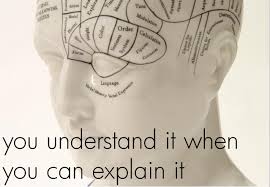记忆方法
将“explain”拆分为“ex”和“plain”。联想“ex”为“出去”,然后想象“plain”为简单的事物,所以“explain”可以想象为“把简单的事物出去说出来”,即解释说明。
以上内容由AI生成, 仅供参考和借鉴
中文词源
explain 解释
ex-, 向外。-plain, 平的,词源同plan, plain. 即展开,解释。
英语词源
- explain
-
explain: [15] To explain a matter is literally to ‘make it plain’. The word comes from Latin explānāre, a compound verb formed from the intensive prefix ex- and the adjective plānus ‘flat’ (source of English plain). This originally meant ‘flatten out, make smooth’, but the metaphorical sense ‘make clear’ soon took over, and accompanied the verb into English (although in the 16th and 17th centuries a few scholars attempted to revive the literal sense: ‘He must calm and explain his forehead’, Sir Thomas Chalenor, translation of Desiderus Erasmus’ Praise of Folly 1549).
=> esplanade, plain - explain (v.)
- early 15c., from Latin explanare "to explain, make clear, make plain" (see explanation). Originally explane, spelling altered by influence of plain. Also see plane (v.2). In 17c., occasionally used more literally, of the unfolding of material things: Evelyn has buds that "explain into leaves" ["Sylva, or, A discourse of forest-trees, and the propagation of timber in His Majesties dominions," 1664]. Related: Explained; explaining; explains. To explain (something) away is from 1709.
权威例句
- 1. Her aggressiveness made it difficult for him to explain his own feelings.
- 她咄咄逼人的态度让他难以解释自己的感情。
- 2. Hospital discipline was broken. Amy would have to explain herself.
- 破坏了医院的纪律,埃米将不得不为自己辩解。
- 3. Doctors cannot be bothered to explain what they do.
- 医生们才懒得解释他们所做的事情。
- 4. Our traveller'sbehaviour on the journey is hard to explain.
- 我们的旅客一路上的行为让人很难解释。
- 5. Oh, I can't explain it. It's just unreal. Everybody is so happy.
- 啊,我都没法形容。就是太棒了,每个人都很高兴。
